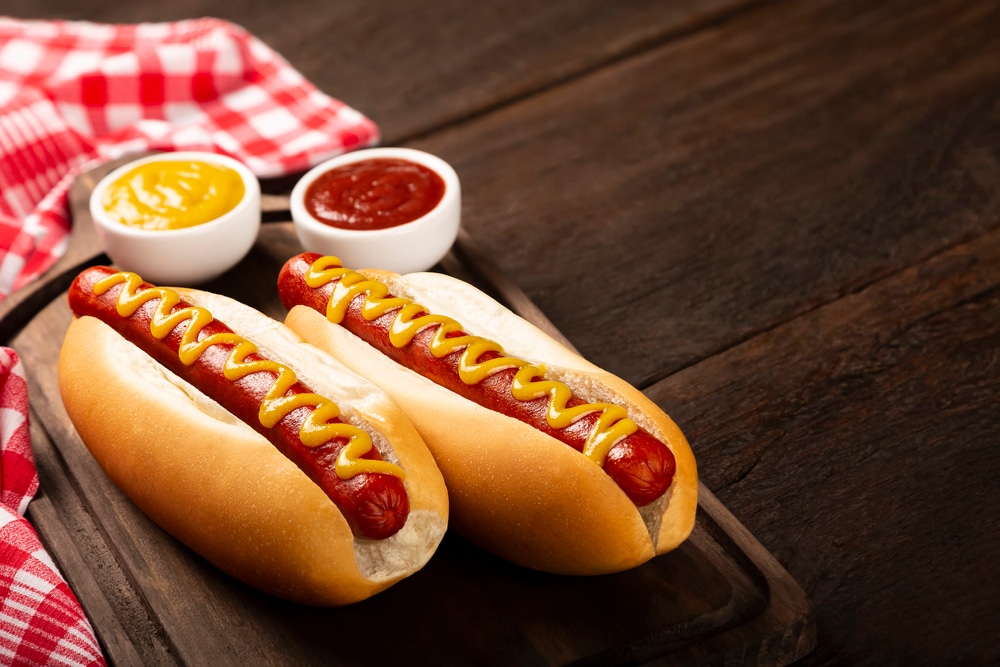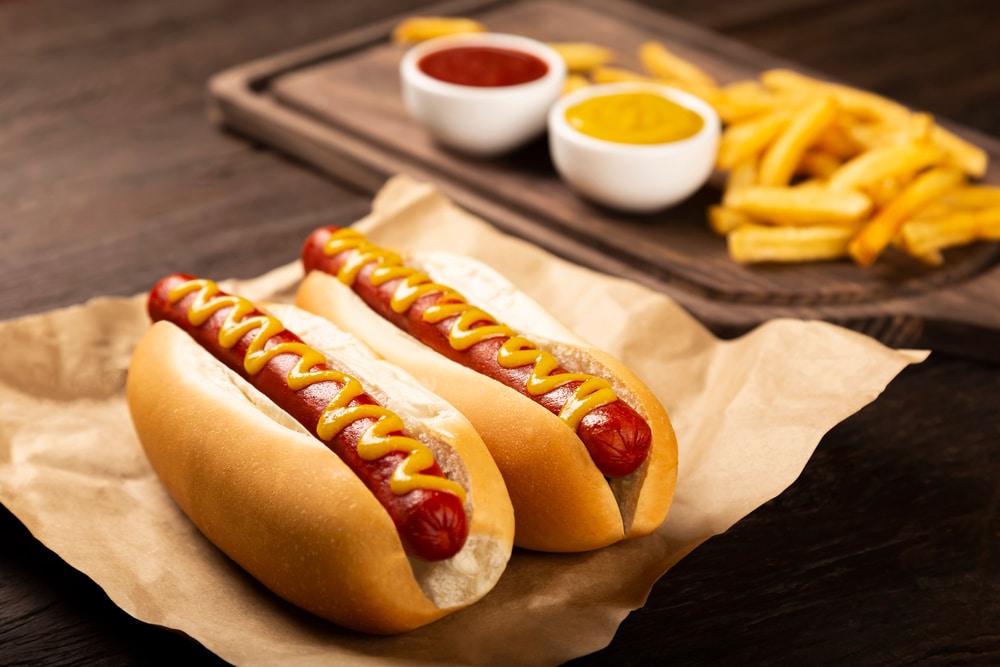Everyone is aware that dogs enjoy their grub. However, when it comes to human food, there are many items they should stay away from. So then the question arises: can our furry friends ever eat hot dogs? Are they safe for your dog?
Feeding your dog hot dogs is not recommended as they are high in fat and sodium, which can be challenging for canine digestion. They also have components that could be detrimental to your pup’s well-being. Hot dogs contain seasonings, preservatives, and fillers that may cause digestive upset or indigestion in some dogs. If you want to treat your pup, opt for healthier options like cooked plain chicken or turkey. If you must give your pup a hot dog, ensure it is simple and unseasoned. And, as always, talk to your veterinarian prior to any diet changes.
Table of Contents
An Overview Of Hot Dogs And Their Ingredients

A hot dog is a delectable dish composed of expertly grilled or steamed sausage served inside the pocket of a freshly sliced roll. Often, “hot dog” can refer to the succulent sausage itself!
German immigrants came to America with more than just sausages, though; they also brought dachshunds. It’s hypothesized that the term “hot dog” was a humorous reference to their thin, elongated canines. The Germans even referred to them as “dachshund sausages” or simply “little dogs” – thus linking the food and its name together!
Ingredients
Hot dogs are composed of a variety of ingredients, including meats like beef and pork, flavorings such as salt, garlic, and paprika, and preservatives (sodium erythorbate and sodium nitrite), along with meat trimmings and fat.
However, in modern times due to shifts in dietary trends or technological advancements within the meat industry, hot dogs may be made using lower-cost poultry parts like chicken or turkey. Furthermore, some manufacturers have even begun creating vegetarian alternatives that no longer rely on animal proteins altogether!
Are Hot Dogs Safe For Dogs?
Absolutely not! Hot dogs can be detrimental to your pup’s health. They contain sodium nitrate, a carcinogen; monosodium glutamate (MSG), and sugar or artificial sweeteners. Furthermore, hot dogs are typically seasoned with garlic, and onion powder – both of which are poisonous for dogs.
Another huge issue with hot dogs is their high levels of sodium. The National Academy of Sciences states that a 33-pound dog requires no more than 200 milligrams (mg) of salt every day. Unfortunately, the regular hot dog contains an astounding 500 mg per serving – meaning that even half a single hot dog would surpass your pup’s daily limit.
Hotdogs are an unfortunate no-go for your pup due to the multitude of unnecessary and unhealthy additives they contain. If you’re looking to spoil your dog with a special treat from the barbeque, opt instead for plain beef, pork, or chicken, completely unseasoned and cut into small pieces – they’ll still like it quite a lot!
Are Hot Dogs Toxic To Dogs?
While hot dogs aren’t toxic to your dog, they are a highly processed food filled with unhealthy fats and salt. Thus, feeding them regularly or in large amounts is not recommended. But don’t worry! A small serving of the delicious treat can be an acceptable indulgence every now and then for your furry friend.
If you must give in to your pup’s begging eyes, opt for a plain hot dog with no seasonings or fillers. This will make it easier for their digestive system to process the food and ensure it does not cause an upset stomach.
The Potential Risks Of Feeding Hot Dogs To A Dog
Dogs love the taste of hot dogs, but they are actually not a healthy food choice for them. The following are some of the issues they can face if they eat a hot dog.
High Blood Pressure
Eating hot dogs can be unhealthy for dogs due to their high sodium content. This can lead to an increase in blood pressure, as the heart has to work harder in order to pump blood throughout the body when there is too much sodium in the bloodstream.
Gastrointestinal Problems And Obesity
High levels of fat and sodium can also cause gastrointestinal issues such as upset stomachs and diarrhea. Hot dogs are often processed with preservatives that can be difficult for a dog’s digestive system to process, resulting in an upset stomach or diarrhea.
Hot dogs are high in fat and calories too, which can lead to obesity if consumed too often. Obesity has been linked to a variety of health issues, such as joint pain, difficulty breathing, and even diabetes.
Toxicity And Cancer
Eating hot dogs has been linked to the potential risk of cancer due to the presence of nitrates, which are chemical compounds that can form carcinogenic compounds when consumed in large quantities. Additionally, some hot dogs contain ingredients such as garlic and onion powder that can be toxic for a dog if ingested in large amounts.
Dehydration And Electrolyte Imbalances
Eating hot dogs can cause dehydration and electrolyte imbalances in dogs due to the fact that they are so high in sodium. A high sodium diet can lead to an electrolyte imbalance, meaning there is too much salt in the body’s fluids. This can cause a decreased ability for the body to absorb water, and it can lead to dehydration.
What To Do If Your Dog Eats Hot Dogs?
If your dog consumes a hot dog, it is important to monitor its behavior and health closely. The most common signs of an issue are vomiting, diarrhea, excessive thirst, panting, lethargy, and changes in appetite. If you notice any of these symptoms, contact your veterinarian immediately, as they can indicate a serious health issue.
Make sure to limit the number of hot dogs your pup consumes in one sitting. For your pup’s special treat, why not select a healthier alternative, like cooked chicken or turkey? They’ll like it!
In Conclusion: Can Dogs Eat Hot Dogs?
Hot dogs are not recommended for dogs due to the high-fat content and additional ingredients that can be bad for their health. While an occasional treat may not harm your pup, it would be wise to avoid making hot dogs a regular part of your dog’s diet. Treats should always be given as an occasional reward in moderation rather than a staple part of your pup’s diet.
We recommend discussing any changes to your pup’s diet with a veterinarian before you make any drastic changes, as they can offer tailored advice based on your dog’s individual health needs. This will help ensure your four-legged friend stays happy and healthy!
So, what do you think about dogs and hot dogs? Let us know in the comments below!
